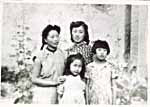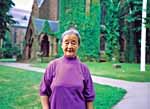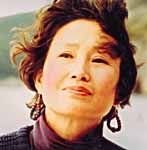Zhang Jie, one of China's most
famous living writers, exudes a calm that comes from
not only surviving the worst calamities of 20th century
China, but transforming this suffering into sublime
art.
She has just completed her magnum
opus Without Words, a more than one million-character
semi-autobiographical epic that spans the length and
breadth of China's tragic 20th century. Critics are
hailing the first installment of the four novel series
as 'China's War and Peace.' Film rights to the novel
have been optioned by the prestigious Forbidden City
Film Studio, with renowned Mongolian-Chinese actress
Siqingaowa slated to play the part of Zhang Jie.

Ten Years
To Grind a Perfect Sword
Despite her casual attire - blue jeans and a simple
sky-blue cashmere sweater - Zhang Jie looks every
bit the Manchurian royalty she is descended from.
Her large bright eyes, high chiseled cheekbones, and
clear taut skin belie her age. At 64, she remains
classically beautiful.

Her composure may perhaps be due
to the fact that she has just completed what she deems
to be the best work of her more than 20-year writing
career. 'Critics debate whether my earlier books were
more socially engagÄ,' Zhang says with an indulgent
smile. 'But I believe that my writing has become more
subtle and refined with time.'
The four-volume epic has taken
a full decade to complete. She began researching in
1990, and has only just finished writing. The first
volume of Without Words was published in December
1999 to critical and popular acclaim. Two more volumes
will be published this year, with the final installment
appearing in 2001.
Zhang Jie quotes the Chinese proverb:
'It takes ten years to grind a perfect sword,' to
describe Without Words. The novel is a radical departure
from her earlier writing, sometimes criticized as
being overly sentimental. Without Words employs a
stream-of-consciousness writing style, with place,
time, and narrative voice shifting so frequently that
author's notes are required to keep the reader from
becoming confused.
The title of the novel derives
from the classical Chinese aphorism: 'The largest
shape is without border, the largest noise is without
sound' (da xing wu xiang, da xi wu sheng). 'And the
grandest story,' Zhang adds 'is without words.'
'Words are so inadequate to convey
the epic tragedy of 20th century China,' Zhang continues
quietly. 'But as an artist with a strong social conscience,
I was compelled to try.'
Without Words portrays characters
from all levels of society: government officials,
military commanders, merchants, artisans and workers.
All pursue their own ideals: riches, love, power,
-isms, and at the end of their life, each one asks
the simple question: Was it worth it?
'Without Words represents a radical
departure from her earlier work for Zhang Jie,' comments
renowned literary critic Zhou Jingbo. 'With this epic,
she has really come of age as a novelist.'
From Manchuria
to Machine Building
Zhang Jie has travelled a long hard road to her present
serenity and success. Born in 1937 in what was then
Manchuria, and is now Liaoning province, her early
years were spent fleeing from the invading Japanese
Imperial army. Her mother, Manchurian royalty by birth
but reduced to poverty by China's perpetual war and
revolt, was a primary school teacher before the Japanese
invasion. She raised Zhang as a single mother, first
fleeing the northeast to the hard-scrabble inland
mountains of Shanxi province before settling in the
south-central Chinese province of Henan.
Zhang Jie was a precocious if willful
child and student. Under her mother's tutelage, Zhang
absorbed China's classical Book of Songs, and the
refined poetry of the Tang (618-907) and Song (960-1279)
dynasties. But her strongest passion was for Western
literature. She consumed the complete works of Russian
novelists Tolstoy, Dostoyevsky, and Punin, and reserved
a special affinity for the American humorist Mark
Twain.

Zhang credits Western literature
with imbuing her with the principles and ideals that
she still lives by today.
'During the (1966-76) Cultural
Revolution, I was criticized as being deeply poisoned
by Western novels,' Zhang says. 'I secretly congratulate
myself and say that if I have one iota of human feeling,
if I do not move up in the world by stepping on other
people, do not use others to gain advantage, it is
in large part due to the influence of the humanism
in classical Western literature.'
At the age of 18, Zhang entered
Beijing's prestigious People's University. Despite
her love of and facility for literature, she was assigned
to the much more utilitarian study of command economics.
'I still regret having missed out
on a diverse liberal arts education,' Zhang laments.
'That China continues to emphasize specialization
over a well-rounded education remains one of the fundamental
flaws of our contemporary system.'
Upon graduation in 1960, Zhang
was assigned to work as a statistician in Beijing's
Ministry of Machine Building. She brought her mother
to live with her in the capital, and, after marrying
a professional colleague, gave birth to her daughter
Tang Di in 1963. Then, for the next 15 years, political
storms engulfed China.
'It was one campaign after another,'
Zhang derisively recounts. 'I could barely keep them
straight.'
The 1964 Socialist Education Movement
was followed soon after by the Cultural Revolution.
In 1968 Zhang was sent to work on a prison farm in
the southwestern province of Jiangxi, thousands of
kilometers from her family in Beijing.
'I tended pigs, worked in rice
paddies where the water came up to my hips╔my sole
focus was on survival,' Zhang reflects with a visible
shudder.
More difficult than the physical
hardship was the four-year separation from her beloved
mother and young daughter. When the worst of the political
storm had subsided, Zhang was reunited with her family
and resumed her government work in Beijing.
Love Must
Not Be Forgotten
Following Chairman Mao's death in 1976, and Deng Xiaoping's
ascendancy to power on the promise of liberalization,
Zhang Jie harked back to her early literary inspiration
to pen the deceptively subtle novella Love Must Not
Be Forgotten in 1979.
Love tells the story of one middle-aged
woman's passionate but unrequited love for a married
man. As a result of her mother's suffering, the disillusioned
daughter-narrator challenges traditional attitudes
toward marriage in modern society, and resolves to
remain single despite society's disapproval.
Love Must Not Be Forgotten was
criticized by remnant Maoist cultural officials for
'undermining socialist morality,' and defending love
outside of marriage. But the novella proved extremely
popular among young Chinese, and won a prestigious
national book award. As a result Zhang left her job
as an economist to become a full-time professional
writer.
In 1980 she published the novel
Heavy Wings, praised at the time as 'China's first
political novel.' Heavy Wings takes the modernization
of China's economy as its central theme. The book
reflects Zhang's strongly-held views on the value
of the individual, and that social and political reform
should accompany economic reforms. Conservative cultural
figures criticized Zhang's book as being 'Anti-Party
and anti-Socialist.'
'I took strong exception to this
criticism,' Zhang recalls with visible indignance.
'I believe in the ideal of Communism. My work criticized
the way ideology is used to cover up corrupt feudal
practices. This remains a problem today.'
Zhang's 1981 novel The Ark recounts
the daily struggle for survival of three professional
women separated from their husbands. At the time it
was widely hailed as China's first feminist novel.
But in her trademark independent style, Zhang resisted
this label.
'I don't consider myself a feminist,'
she says. 'My work opposes all social injustice.'
Zhang remained prolific throughout
the 1980s, producing a string of successful works
and travelling the globe as her writing gained critical
and commercial international acceptance.
A Room of
One's Own
Despite her celebrity, Zhang leads a simple writer's
life. She rises shortly past dawn each morning to
a steaming mug of coffee (a habit she picked up while
traveling in Europe) and her own fresh-baked whole-wheat
bread. Then she writes until noon, when she breaks
for lunch and a short nap.
She writes through the afternoon
into early evening, and her nights are occupied with
newspaper reading, catching up on her correspondence
and visits with friends. She retires before midnight
to be fresh for another day in her world of fiction.
'I cried when the first installment
of Without Words was published,' Zhang confesses.
'It was like saying goodbye to an old and dear friend.'
She is a staunch advocate of the
notion most often attributed to Virginia Woolf that
women must have a room of their own and adequate income
to create literature.
'Money and time (you qian you xian),'
Zhang cites as the two prerequisites for modern women's
literature. 'These conditions should be a priority
of society; humanity will benefit immensely from women
truly being permitted to hold up half the sky.'
Gathering
Wheat
A short story by Zhang Jie
What country girl wouldn't know about gathering
wheat stalks! Let me tell you a story of long long
ago when you might almost say wheat gathering time
was when girls' imaginations were the most alive.
In the early hours of the dawn, under a waning moon
and a sprinkling of stars, what would a girl with
a basket on her arm be thinking of as she walked along
the ridges in the fields on her way to gather wheat
stalks? When a thin mist hovered over the fields and
the moon rose silently again as if it had wakened
from a stolen nap, what was the girl thinking of as
she walked back home with a basket on her arm filled
with wheat stalks? Well, what else could she think
of? If you've never been part of that life, you will
never know the dreams these stalks of wheat scattered
in the fields could conjure up.
She stoops and bends with no respite to pick the
scattered stalks. She will sell the wheat, and save
the money, and on a market day, she will go to the
market and buy flowered cotton cloth and colored thread.
Then she will return home and cut and sew and embroider.
Nobody has seen her wear her finery, but on her wedding
day, she will invariably stuff these sartorial treasures
into her bridal baggage, as all the other girls do,
though no one has seen them making an agreement.
But the dreams they dreamt while gathering wheat
were nothing more than dreams. In years the girls
would realize how naive they had been, how different
were the men they had married to the men of their
dreams as they gathered wheat and sewed and embroidered.
They had let themselves be married off so docilely.
As they put on their new clothes and new shoes, the
thrill that had gone into the making of them had disappeared.
And so what! Nobody would sigh for them, or commiserate
with them for their lost dreams. Even they themselves
would not yield to excessive grief: at most they had
lost a beautiful dream. Who would be so foolish as
to hold on to a dream!
When I was old enough to be running about on my
own, I would trudge behind my elder sister to pick
wheat, with a basket too on my arm. The basket was
always too big for me; it would bounce against my
legs or drag along the ground. Often it made me stumble.
I rarely filled my basket. Either I missed the wheat
stalks lying in the fields, or I was distracted by
grasshoppers and butterflies. Sometimes even the stalks
in my basket tumbled out as I chased after butterflies.
One day, my second aunt saw the few stalks of wheat
in my basket and asked me: "Oho! so our little Dayan
can gather wheat. Now aren't you going to tell auntie
why are you gathering wheat?'
I was not at all embarrassed: 'For my trousseau.'
Auntie laughed derisively and winked at a couple of
women who had gathered around us. 'And whom are you
going to marry?' she asked.
Yes, whom was I going to marry? I thought for a moment
and suddenly remembered the old man who sold sticky
candy. I said: 'I'll marry the old man who sells sticky
candy.'
They all burst out laughing, sounding like a gaggle
of geese. What is there to laugh at? I was angry.
What's wrong with marrying the old candy seller? Was
he too good for me?
How old was the candy seller? I didn't know. The
lines on his forehead gathered at the ends of his
eyebrows and then crept down his cheeks on both sides
to disappear into the corners of his mouth. These
lines added a kindly humor to his face. As he walked
on his way balancing a shoulder pole carrying his
goods, his bald head shone like a gourd, and the long
straggling white hair growing at the back of his head
quivered with each movement of his body as he walked
to the bounce of the pole balanced on his shoulder.
Very soon my words reached his ears.
One day, he came to our village with his goods. He
saw me and smiled: 'And so, you want to be my bride?'
'Yes.'
He laughed. The few strands of white hair at the back
of his gourd-like pate also quivered.
'Now why do you want to be my bride?'
'I want to eat sticky candy.'
He took out his pipe and banged it against the sole
of his shoe. 'Well, you are too small.'
'Wait till I grow up,' I said.
He patted me on the head and said, 'Before you grow
up, I'll be in the ground.'
I was worried. If he dies, what shall I do? My eyebrows
knitted together in perplexity.
He put a piece of candy into my hands. I grinned and
said:
'Don't go and die, wait for me to grow up.'
He smiled and said, 'All right, I'll wait for you
to grow up.'
'Where do you live?'
'This shoulder pole with two baskets on either end
is my home. Wherever it takes me, that is home and
hearth for me.'
Thereafter, whenever he passed
our village, he would bring me a little gift. A piece
of candy, a melon, a handful of dates╔ 'For my little
bride,' he would say jokingly.
On my part, I imitated the big
girls and made my mother cut out some pieces of cotton
cloth for a tobacco pouch and even made her mark out
a flower pattern on it. I sewed and embroidered for
days, and finally my tobacco pouch was done. My mother
exploded with laughter when she saw it and said it
looked more like a piece of pork liver than any tobacco
pouch. However, I asked mother to keep it for me.
I said I would give it to my husband when I marry.
Year by year I grew until I reached
the wheat gathering age, and realized what a fool
I had made of myself with those childish words. The
old peddler of sticky candy had long ago stopped making
jokes about me being his little bride. But he still
gave me small gifts. I knew that he was sincerely
fond of me. And I had also grown fond of him. Whenever
he passed through our village, I would always see
him off. As we said goodbye, I would stand at the
top of a high ground and watch his receding back until
it vanished among the hills. Year by year I could
see his back bend more and more under the shoulder
pole. Now I was really worried that he might die.
On the day before the Eighth of
the Twelfth Moon Festival, I expected that my old
friend would come by our village on his rounds. I
stood at the top of a hill beneath an old persimmon
tree and watched the road in the valley below, waiting
for him to appear.
At the very top of the old persimmon
tree, there was one last fruit. Under the winter sun,
it blazed out in a concentrated brilliance of redness.
Probably because of the sheer height, it had not been
picked. Strange, though, that it had not been blown
off by the winds, nor pelted down by rain, nor crushed
by snow.
Someone carrying a shoulder pole
appeared on the road below. As he approached I saw
that two baskets were balanced on a shoulder pole.
But it was not my old candy peddler. I greeted the
stranger and inquired after my old friend and learned
that he was dead. I stood under the persimmon tree,
looking at the lone little persimmon. Its flaming
redness was a joyous sight, but I cried for the strange
old candy peddler who had been so fond of me.
Later on, I wondered why. For no
other reason than that I was a foolish little thing
who loved sticky candy, with few to love me because
of my plain face.
When I grew up, I could never forget
that apart from my own mother, no one had loved me
so fondly and so disinterestedly.
I often think of him now, and have
tried to find that tobacco pouch that had looked like
a piece of pork liver. But I don't know what became
of it.





